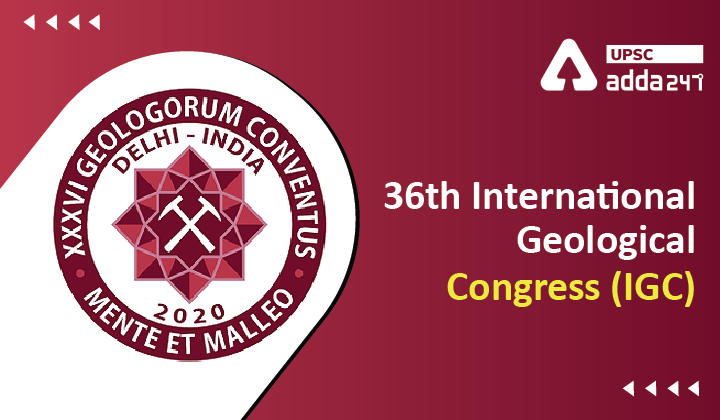Table of Contents
International Geological Congress (IGC)- Relevance for UPSC Exam
- GS Paper 2: International Relations- Important International institutions, agencies and fora- their structure, mandate.
36th International Geological Congress (IGC) in News
- The reformatted 36thInternational Geological Congress is being organized jointly by the Ministry of Mines, Ministry of Earth Sciences, Govt. of India and Indian National Science Academy.
Key Points about 36th International Geological Congress (IGC)`
- 36th International Geological Congress (IGC)` is being organized on a virtual platform with the support of India’s neighboring countries- Bangladesh, Nepal and Sri Lanka.
- Theme of 36th IGC: “Geoscience for the next decade: Challenges and Society”.
- The scientific program under 36th IGC reflected on how Geosciences are integrally related to a sustainable future, touching various aspects of life.
- 36th International Geological Congress (IGC) was attended virtually by the geoscience community over the world with its inaugural ceremony in a hybrid mode.
Colombo Security Conclave (CSC)
International Geological Congress (IGC)- Key Points
- About: International Geological Congress (IGC) is a nonprofit scientific and educational organization. International Geological Congress (IGC) is also described as the Olympics of Geosciences.
- Meetings of the IGC are held in collaboration with and under the sponsorship of the International Union of Geological Sciences (IUGS).
- IUGS holds its General Assemblies in conjunction with Sessions of the IGC.
- Frequency of IGC Meetings: IGC’s are held quadrennial, under the aegis of the International Union of Geological Congress (IUGS), the scientific sponsor of IGCs.
- Mandate: The main purpose of the Congress is to encourage the advancement of fundamental and applied research in the Earth sciences worldwide.
Key Facts about International Union of Geological Sciences (IUGS)
- About: International Union of Geological Sciences founded in 1961, with 121 national members, representing over a million geoscientists.
- The IUGS is one of the World’s largest scientific organizations.
- The IUGS is a member of the International Science Council (ISC).
- Mandate: The IUGS encourages international co-operation and participation in the Earth sciences in relation to human welfare.
- IUGS Membership: its membership is open to countries or defined regions.
Key Functions of the International Union of Geological Sciences (IUGS)
- IUGS promotes and encourages the study of geological problems, especially those of worldwide significance.
- IUGS also supports and facilitates international and interdisciplinary cooperation in the Earth sciences.
- IUGS gives special consideration to-
- International standards;
- Geoscience education;
- Geoscience information;
- Environmental management and hazards.
- IUGS works through topic-specific Commissions, Task Groups, and Initiatives as well as Joint Programs with other organizations, that are concerned with a wide range of geologic research of direct interest to governments, industry, and academic groups within the Earth sciences.
- IUGS aims to promote the development of the Earth sciences through the support of broad-based scientific studies relevant to the entire Earth system-
- To apply the results of these and other studies to preserving Earth’s natural environment, using all natural resources wisely and improving the prosperity of nations and the quality of human life; and
- To strengthen public awareness of geology and advance geological education in the widest sense.
- IUGS fosters dialogue and communication among the various specialists in earth sciences around the world.
- IUGS achieves this by organizing international projects and meetings, sponsoring symposia and scientific field trips, and producing publications.





 TSPSC Group 1 Question Paper 2024, Downl...
TSPSC Group 1 Question Paper 2024, Downl...
 TSPSC Group 1 Answer key 2024 Out, Downl...
TSPSC Group 1 Answer key 2024 Out, Downl...
 UPSC Prelims 2024 Question Paper, Downlo...
UPSC Prelims 2024 Question Paper, Downlo...
